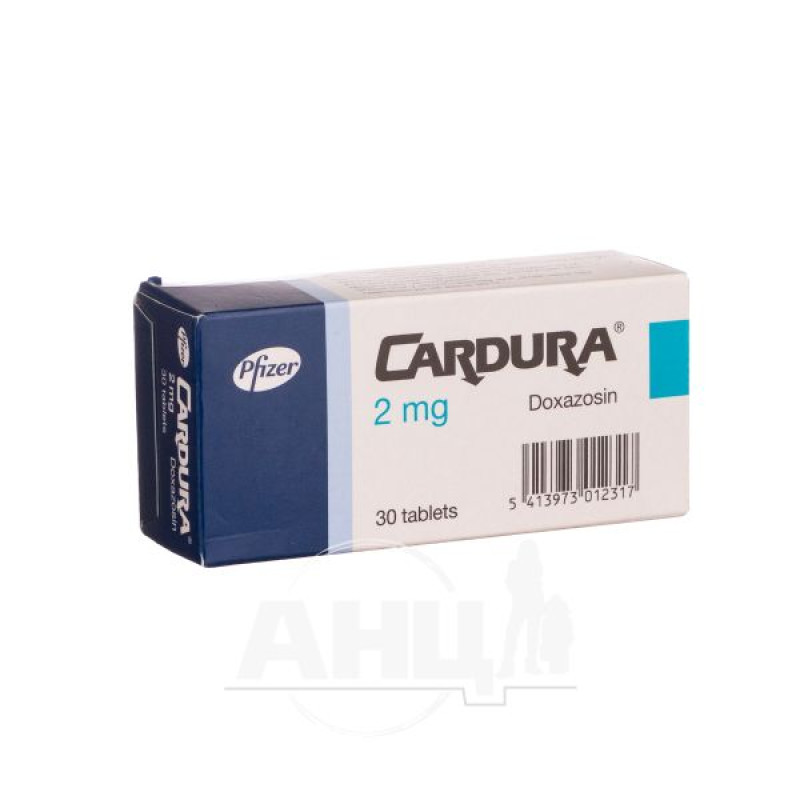Cardura tablets 2 mg blister No. 30

Cardura ® tablets are used for the following indications:
hypertension: the drug is indicated for the treatment of hypertension and for most patients it can be used to control blood pressure as monotherapy (in case of ineffectiveness of monotherapy for the treatment of hypertension, the drug can be used in combination with thiazide diuretics, β-adrenoceptor blockers, calcium channel blockers and ACE inhibitors); benign prostatic hyperplasia: the drug is indicated for the treatment of urinary tract obstruction, as well as symptoms associated with benign prostatic hyperplasia (BPH) (the drug can be prescribed to patients with BPH both in the presence of hypertension and with normal blood pressure).Composition
The active substance is doxazosin (one tablet contains 2.43 mg of doxazosin mesylate, which is equivalent to 2 mg of doxazosin).
Excipients: lactose monohydrate; magnesium stearate; microcrystalline cellulose; sodium lauryl sulfate; sodium starch glycolate (type A).
Contraindication
The use of the drug "Cardura ®" is contraindicated in the following categories of patients:
patients with hypersensitivity to the active substance or to quinazoline derivatives (e.g. prazosin, terazosin, doxazosin) or to any of the excipients listed in the "Composition" section; patients with a history of orthostatic hypotension; patients with BPH and concomitant upper urinary tract obstruction, chronic urinary tract infections or the presence of bladder stones; during breastfeeding (only when used for the treatment of arterial hypertension); patients with hypotension (applies only to patients with BPH).Doxazosin as monotherapy is contraindicated in patients with bladder overactivity or anuria with or without progressive renal insufficiency.
Method of application
The drug "Cardura ®" can be taken both in the morning and in the evening.
The drug is administered orally.
Arterial hypertension
The drug should be used once a day. The initial dose is 1 mg to minimize the risk of orthostatic hypotension and / or syncope. After 1-2 weeks of initial therapy, the dose can be increased to 2 mg, and then, if necessary, to 4 mg. In most patients, the response to therapy is observed when using the drug at a dose of 4 mg or lower. If necessary, the dose can be increased to 8 mg or to the maximum recommended dose of 16 mg.
Benign prostatic hyperplasia
The recommended initial dose of Cardura® is 1 mg once daily to minimize the risk of orthostatic hypotension and/or syncope. Depending on the individual patient's urodynamics and symptoms of BPH, the dose may be increased to 2 mg, then to 4 mg and to the maximum recommended dose of 8 mg. The recommended dose adjustment interval is 1-2 weeks. The recommended dose is 2-4 mg per day.
Application features
Pregnant women
Patients with arterial hypertension. Due to the current lack of adequate and well-controlled studies on the use of the drug in pregnant women, the safety of the drug "Cardura ®" during pregnancy remains unestablished. Therefore, the drug should be used only when the potential benefits of treatment, from the physician's point of view, justify the potential risk.
Patients with BPH: The information in this section does not apply to patients with BPH.
Children
The safety and effectiveness of the drug "Cardura ®" in children have been studied.
Drivers
The ability to drive and use machines may be impaired, especially at the beginning of treatment.
Overdose
If an overdose of the drug has led to hypotension, the patient should be urgently placed on his back with his head down. In some cases, other symptomatic measures may be taken.
If symptomatic measures are not sufficient, shock should be treated first with plasma substitutes. Then, if necessary, vasoconstrictors should be used. Renal function should be monitored and supportive measures should be applied if necessary.
Hemodialysis is not indicated because doxazosin is highly bound to plasma proteins.
Side effects
Arterial hypertension
In clinical studies involving patients with arterial hypertension, the most common adverse reactions were postural-type (which in some cases were accompanied by loss of consciousness) or non-specific adverse reactions.
Benign prostatic hyperplasia
According to controlled clinical studies, patients with BPH had the same adverse reaction profile as patients with hypertension.
Storage conditions
Store at a temperature not exceeding 30 °C, out of the reach of children.
Shelf life - 5 years.
There are no reviews for this product.
There are no reviews for this product, be the first to leave your review.
No questions about this product, be the first and ask your question.



